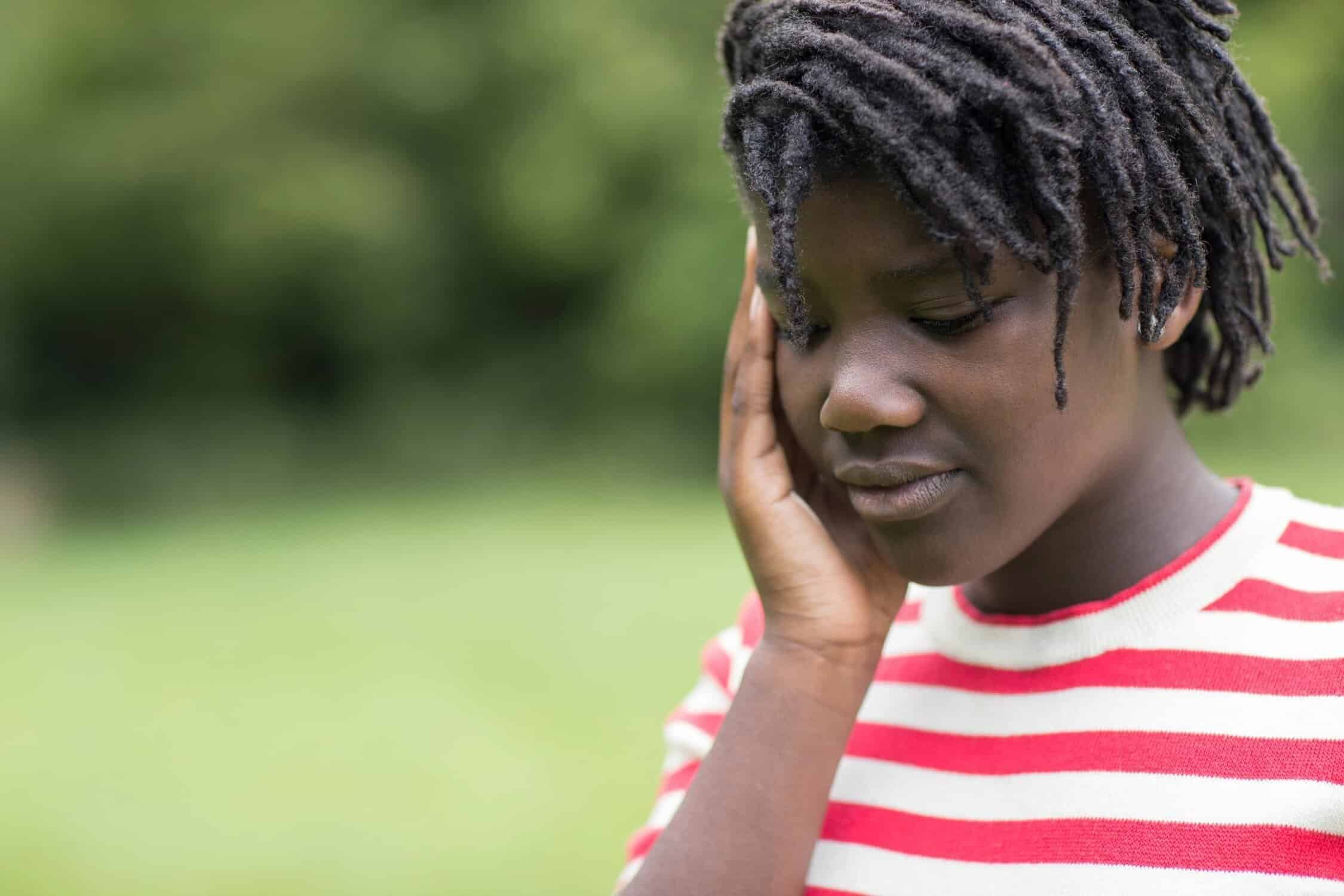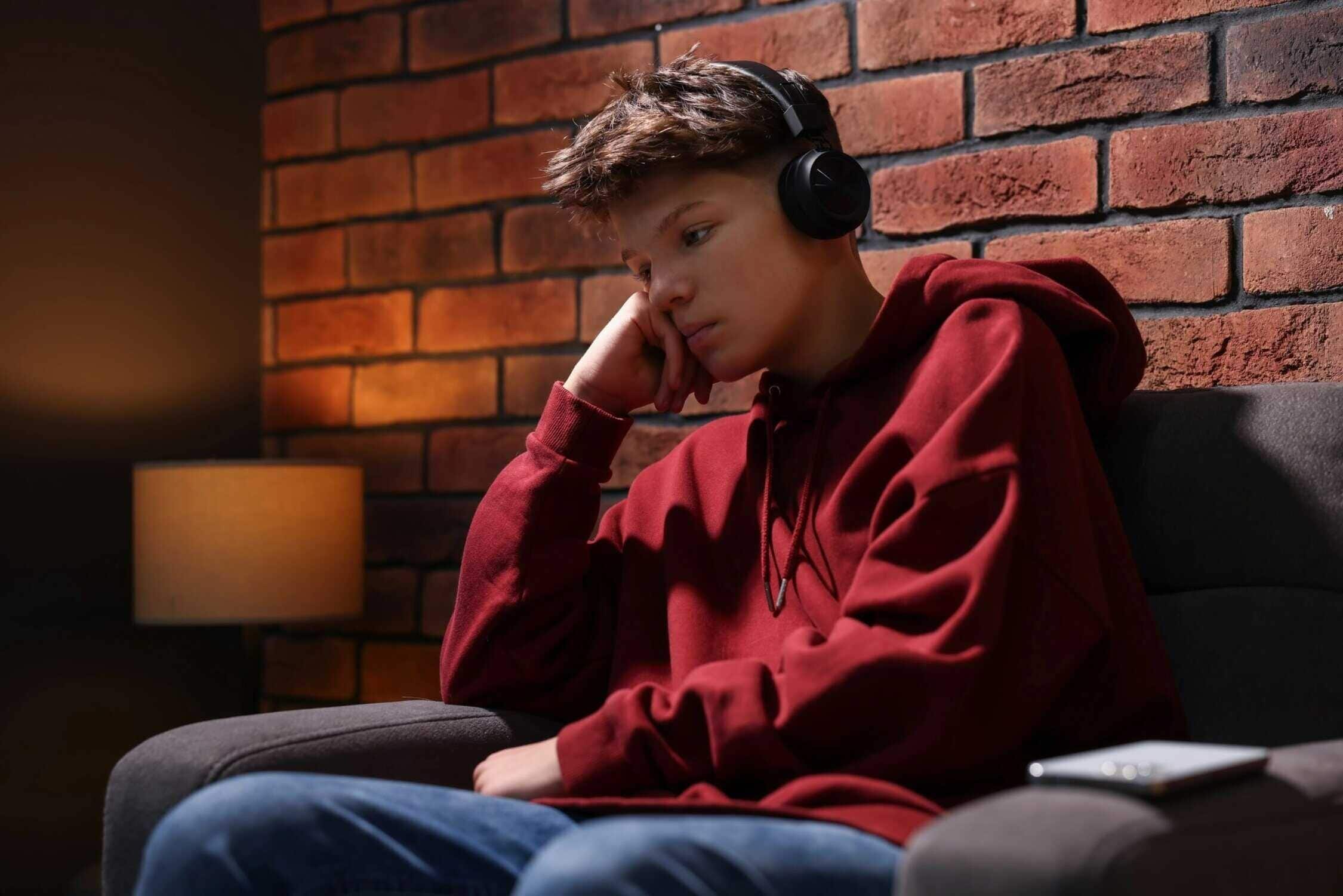Home | Teen Mental Health | Trauma & PTSD
Teen Trauma and PTSD Treatment in California
When a teen has a traumatic event, it can harm their whole life. Our teen trauma treatment center offers a supportive space where teens feel safe and can start a real healing journey. We use proven therapies and caring support to treat trauma, helping young people rebuild their lives.
Table of Contents
Understanding Teens with PTSD and Trauma
Traumatic experiences can have a powerful effect on adolescent mental health. Teens with PTSD may develop symptoms after experiencing or witnessing events such as abuse, neglect, bullying, accidents, medical trauma, violence, or sudden loss.
While every teen processes trauma differently, unresolved traumatic stress can disrupt emotions, behavior, school performance, and relationships.
A teen struggling with PTSD and trauma may experience flashbacks, nightmares, emotional numbness, hypervigilance, irritability, or avoidance of reminders of the event.
These symptoms often contribute to anxiety, depression, self-harm, or substance use when left untreated. Because the adolescent brain is still developing, early intervention is essential.
With the right support, recovery is possible. Trauma-informed therapy helps teens process painful experiences, build effective coping strategies, and regain a sense of safety and confidence.
At Key Healthcare, our trauma-focused programs provide compassionate, evidence-based care designed to help teens heal and move forward with resilience.
What Increases Complex Trauma Risk in Teens?
After a traumatic event, some factors increase a teen’s risk of developing post-traumatic stress disorder (PTSD) or other mental health issues. Knowing these patterns helps parents step in early to give their child the needed support.
A 2025 umbrella review published in Child and Adolescent Psychiatry and Mental Health analyzed data from over 121,000 children and adolescents and found that about 1 in 4 young people exposed to trauma go on to develop PTSD. The review also identified key risk factors that increase the likelihood of PTSD after trauma, including:
- Older age (teens over 14 are often more at risk than younger children)
- Being female (girls are about twice as likely as boys to develop PTSD)
- Low social support (teens without strong family or peer support face a higher risk)
- Feeling trapped or helpless during the traumatic event
- Losing a family member or loved one
The VA National Center for PTSD also notes that how bad the trauma was and how close the teen was to the event shape their risk. For example, events caused by people, such as assault or abuse, are more likely to cause PTSD than natural disasters.
Your teen may be at a higher risk for PTSD if they are older, female, feel alone, or have lost someone close. However, trauma-focused therapy and strong family support can greatly lower these risks and help your child build strength. At Key Healthcare, we are here to help your child start the recovery process through teen PTSD treatment.
Help Your Teen Heal from Trauma and PTSD
If your teen is struggling with the effects of trauma or PTSD, Key Healthcare is here to help. Our specialized teen trauma therapy program offers evidence-based therapies and compassionate support tailored to the unique needs of adolescents. Contact us today to take the first step toward healing and hope.
Warning Signs to Look For in Teens Who Experienced Trauma
Are you wondering if what you’re seeing is normal stress or something more?
PTSD symptoms in teens often look like those in adults, but they are more likely to appear as risky, impulsive, or aggressive behaviors. This can look like your teen is pushing limits or acting like nothing is wrong when they feel overwhelmed inside.
According to the VA National Center for PTSD, here are warning signs that may show your teen is dealing with PTSD.
Re-Experiencing or Intrusions
Your teenager may relive the trauma in unexpected ways. It is common to have nightmares or be triggered by certain sounds or smells. Some teens replay parts of the event in daydreams or conversations. While they may not talk about it, sudden changes in mood or behavior can show what they feel inside.
Avoidance Behaviors
Avoidance is another sign to watch for. Teens with trauma may stay away from people or topics that remind them of the event. They might also skip activities they used to enjoy or pull away from friends and family. This withdrawal is often a way to protect themselves from painful reminders.
Negative Mood and Cognition Changes
Trauma can change how a teen sees themself and the world. A teenager might feel a constant sadness or shame, or act like nothing matters. A teen with PTSD may also lose happy feelings or believe the world is totally unsafe.
Heightened Arousal and Reactivity
Some teens are always on edge and may be easily startled, get angry quickly, or have trouble focusing. Sleep problems are also common, like trouble falling asleep or waking up often from nightmares. This restlessness can sometimes be mistaken for ADHD.
Risky or Self-Destructive Coping
Some teens try to numb their pain instead of talking about it. This can lead to using drugs or alcohol, reckless driving, fighting, or self-harm. These behaviors are often desperate ways to feel in control or escape difficult emotions.
School and Social Struggles
PTSD can affect every part of a teen’s life. You might notice falling grades or lots of absences from school. Your child may seem withdrawn or have conflicts with friends. These changes can be the first clues that trauma is having an effect.
If you see these signs, you do not have to handle it alone. At Key Healthcare, we focus on trauma therapy and proven care for teens. Our programs offer a supportive space for your child to process their experiences and find hope. With the right care and family support, healing is possible for your teenager.






Our goal in developing Key Healthcare was to create programs that gave teens the guidance they needed to draw on their strengths and realize their potential to live fulfilling happy lives. Based on our own experiences, we believe that everyone has the ability to change if given the proper structure and connection

Ryan Blivas & Evan Powell
Founders of Key Healthcare
Why Teens Need Special Care After Trauma
Adolescence is already a time of great change. After a traumatic event, these changes can feel overwhelming and even unsafe. Trauma does not just fade over time. Without proper support, it can shape how you see yourself and the world.
Research shows that traumatic stress in teens often leads to:
- A higher risk for long-term mental health issues
- Trouble with coping skills and solving daily problems
- A greater risk for substance abuse and other related problems
Trauma can affect your relationships and even your physical health. The good news is that with the right therapy, you can learn coping skills and build resilience. This healing helps create a foundation for long-term mental wellness.
Trauma and PTSD Teen Trauma Treatment Options
Our center combines caring support with proven methods. Each treatment plan is made for the individual, mixing therapies that get to the root of the problem.
Intensive Outpatient Treatment (IOP)
An intensive outpatient program (IOP) allows your teen to get regular trauma care while living at home. They will attend about 9 hours a week, with sessions that fit around school and family life.
A 2022 study in the European Journal of Psychotraumatology looked at how patients felt about intensive outpatient PTSD treatment. People said it was hard work but worth the effort. They reported fewer symptoms and new hope for the future. They liked the group unity and said physical activity was a key part of staying involved.
Partial Hospitalization Treatment (PHP)
A partial hospitalization program (PHP) offers more structure than an IOP, much like a school day focused on healing. Teens spend 8 hours a day, five days a week, in therapy. They learn emotional control and often join family sessions to improve their home environment.
For teens, PHP can be a powerful bridge. It is more involved than outpatient therapy but still allows them to go home each night.
Residential Treatment Program
Sometimes, the best step toward healing is to step away. A residential treatment program gives your teen 24/7 care in a safe place. This is key if home life is stressful or symptoms are too much for outpatient care.
Research has found that both short-term and long-term inpatient programs can reduce PTSD, depression, and anxiety symptoms.
For teens, live-in care offers a whole-person approach. It includes trauma therapy and skill-building, creating the space needed for recovery before returning to daily life.
Therapeutic Modalities for Treating Trauma at Key Healthcare
If your teen is struggling after trauma, research has already shown what works best.
A 2025 study in JMIR Research Protocols found the best PTSD treatments for teens are trauma-focused cognitive behavioral therapy (TF-CBT) and EMDR. These therapies reduce symptoms and help prevent teens from leaving long-term care early.
The study showed how programs that mix TF-CBT, EMDR, caregiver coaching, and body-based therapies can make healing more engaging and lasting.
At Key Healthcare, we bring that research to life by offering:
- Trauma-Focused Cognitive Behavioral Therapy (TF-CBT) – helps your teen face and change how they see traumatic memories.
- Eye Movement Desensitization & Reprocessing (EMDR) – changes how the brain handles painful memories.
- Cognitive Behavioral Therapy (CBT) – teaches better ways of thinking and coping skills.
- Dialectical Behavior Therapy (DBT) – builds emotional control and helps your teen make safer choices.
- Acceptance & Commitment Therapy (ACT) – guides your teen to accept difficult feelings while focusing on their values.
- Family Therapy – strengthens family bonds and helps you support your child’s recovery.
- Group Therapy– connects your teenager with peers who understand what they are going through.
- Individual Therapy – offers private space for personal growth and safety planning.
- Psychomotor/Body-Based Interventions – gives your teen tools to calm down and reconnect with their body.
By mixing proven trauma therapies with caring support, we give your child the best chance for lasting recovery and new confidence.
It might feel like a big step, but remember why you're here—you’re looking for a way forward.
FAQ
What is the best individual therapy for healing from childhood trauma?
The most effective teen trauma therapy program combines evidence-based approaches tailored to each adolescent’s needs. Individual therapy for teens with trauma often includes cognitive behavioral therapy (CBT), trauma-focused CBT, and other trauma-informed methods proven to reduce symptoms of teen post traumatic stress disorder.
At Key Healthcare, every teen receives a personalized teen trauma treatment plan designed to help teens with PTSD process painful experiences, build coping skills, and restore emotional stability.
How do trauma and mental health conditions connect in children and adolescents?
Trauma can strongly influence emotional and psychological development. Teens with trauma are at higher risk for anxiety, depression, self-harm, substance use, and school difficulties. Without proper teen PTSD treatment, traumatic stress can evolve into long-term mental health concerns.
Comprehensive teen trauma disorders treatment addresses both trauma symptoms and co-occurring conditions to support whole-person recovery.
Why should I seek treatment instead of handling it alone?
Many families try to manage trauma symptoms independently, but untreated teen PTSD can worsen over time. A professional teen trauma treatment center provides structured care, safety, and clinical expertise that is difficult to achieve at home.
Specialized teen trauma treatment centers and adolescent trauma residential treatment programs offer consistent support, therapeutic interventions, and family guidance that promote lasting healing.
What makes Key Healthcare’s approach different?
Key Healthcare offers comprehensive, adolescent-focused trauma care in a supportive and nurturing environment. Our teen trauma treatment center integrates individualized therapy, group support, family involvement, and experiential therapies to help teens with PTSD rebuild confidence and emotional resilience.
Families seeking PTSD treatment Los Angeles or trauma treatment Los Angeles can trust our evidence-based, developmentally appropriate care designed specifically for adolescents.
How do art therapy, family therapy, cognitive behavioral therapy, equine therapy, and family involvement work together to support teens' healing from trauma?
Healing from trauma often requires multiple therapeutic approaches. At Key Healthcare, art therapy allows teens to express emotions safely, cognitive behavioral therapy helps reframe traumatic thought patterns, equine therapy builds trust and emotional awareness, and family therapy strengthens communication and support systems.
Combined, these services create a well-rounded teen trauma therapy program that addresses emotional, behavioral, and relational healing. This integrated approach is especially effective for teens with PTSD and those seeking PTSD treatment centers California families rely on.
Sources
Cisler, J. M., & Herringa, R. J. (2021). Posttraumatic Stress Disorder and the Developing Adolescent Brain. Biological psychiatry, 89(2), 144–151.
Long and Short Duration Inpatient Treatment Programs for the Treatment of Post-Traumatic Stress Disorder: A Review of the Comparative Effectiveness and Guidelines [Internet]. Ottawa (ON): Canadian Agency for Drugs and Technologies in Health; 2016 Sep 7. CONCLUSIONS AND IMPLICATIONS FOR DECISION OR POLICY MAKING. Available from:
Tamir, T. T., Tekeba, B., Mekonen, E. G., Gebrehana, D. A., & Zegeye, A. F. (2025). Shadows of trauma: an umbrella review of the prevalence and risk factors of post-traumatic stress disorder in children and adolescents. Child and adolescent psychiatry and mental health, 19(1), 48.
Thoresen, I. H., Auren, T. J. B., Langvik, E. O., Engesæth, C., Jensen, A. G., & Klæth, J. R. (2022). Intensive outpatient treatment for post-traumatic stress disorder: a thematic analysis of patient experience. European journal of psychotraumatology, 13(1), 2043639.
U.S. Department of Veterans Affairs, National Center for PTSD. (2025, March 26). How common is PTSD in children and teens? PTSD: National Center for PTSD.
U.S. Department of Veterans Affairs, National Center for PTSD. (2025, March 26). PTSD in children and teens. PTSD: National Center for PTSD.
Westerveld, M. M., van der Mheen, M., Knipschild, R., Maijer, K., de Keizer-Altink, M. E., Albisser, N., Hoekstra, M. J. E., Timmermans-Jansen, A., Zijp, R., Krabbendam, A. A., van Steensel, F. J. A. B., Kan, K. J., Huyser, C., Staal, W. G., Utens, E. M. W. J., & Lindauer, R. J. L. (2025). Short- and Long-Term Effectiveness of Brief Intensive Trauma Treatment for Adolescents With Posttraumatic Stress Disorder and Their Caregivers: Protocol for a Multicenter Randomized Controlled Trial. JMIR research protocols, 14, e66115.
Request a Call
Is your teen struggling with mental health or substance use challenges?
Request a confidential call today – our team will walk you through the admissions process, treatment options, costs, and what to expect. Reaching out is a powerful first step toward a healthier future for your teen and your family.
"*" indicates required fields
Insurances we Accept
Start Your Healing Journey: Take the First Step Toward Healing Teen Trauma Today at Key Healthcare
If your teenager is struggling after a traumatic event, now is the time to act. At Key Healthcare, we focus on treating children and teens with the care and skill we have gained from over a decade of helping families.
Contact us today to learn about our treatment options. Through our outpatient, partial day treatment, or live-in programs, your teen will get care in a supportive space. We want to help them become their confident selves again.
Get in touch with our team of mental health professionals and begin your healing journey today.
If you are ready to get help for your child, we are here to help. Feel free to call us, email, or fill out our contact form to get started today. You can also verify your insurance to begin the process.
Check Insurance
Structure, support, and a path forward. See how programs at Key Healthcare help teens thrive.
Take the first step by verifying your insurance today and finding out what coverage options are available for your family. Our team will review your benefits and help you understand how to access the care your teen needs.
Author

Ryan, Blivas
Medically reviewed by

Elnaz Mayeh PhD, LMFT
As Executive Director, Dr. Mayeh is dedicated to maintaining Key Healthcare’s reputation as a premier adolescent treatment center, fostering a stable and supportive environment for both clients and staff. Her leadership focuses on clinical integrity, staff development, and creating a culture of compassion and growth.
Share Program
Is your teen struggling?
Call today for a confidential conversation with a teen treatment specialist—we’re here to help.
Programs
Mental Health
Check Insurance
Check if your insurance will cover the cost of treatment.
"*" indicates required fields
- Your information is secure & protected by HIPPA.












